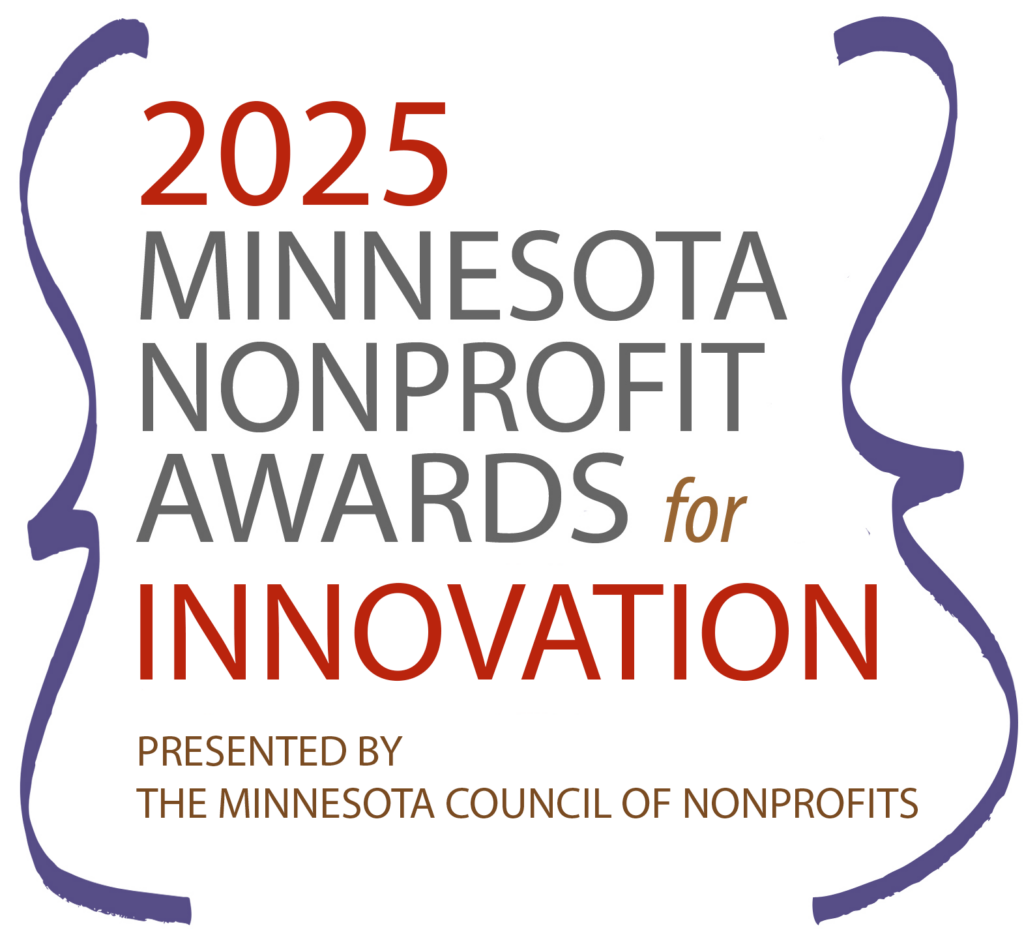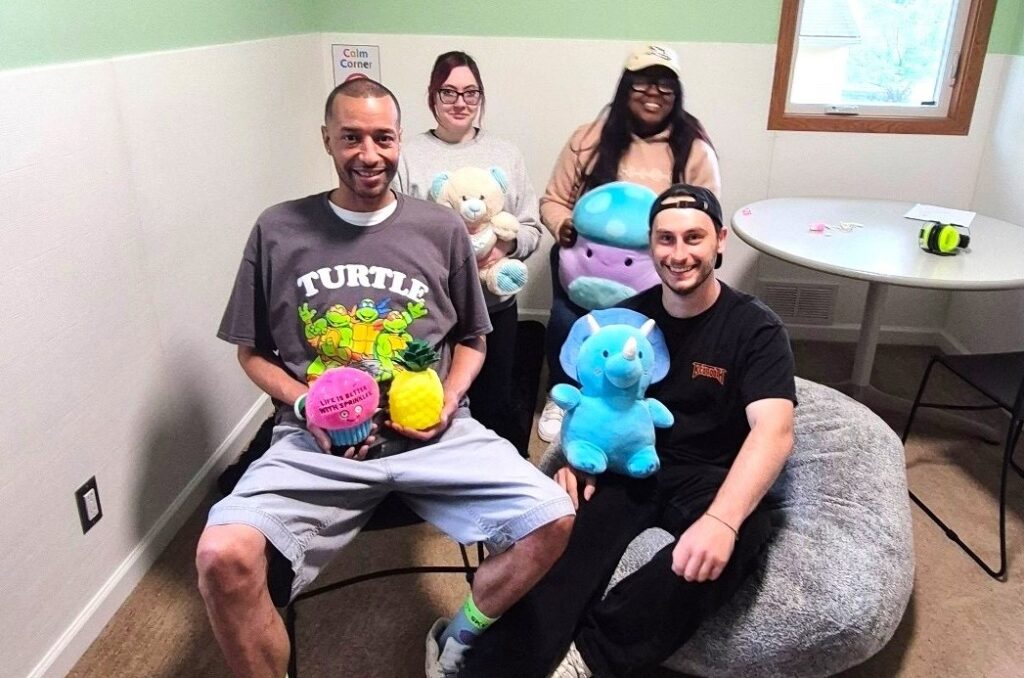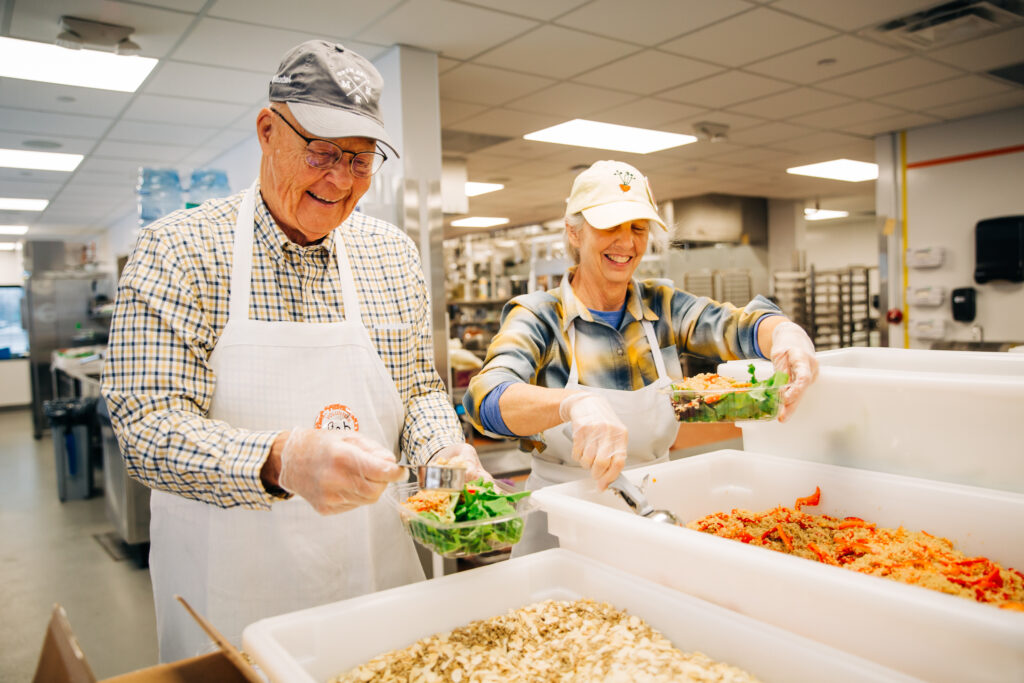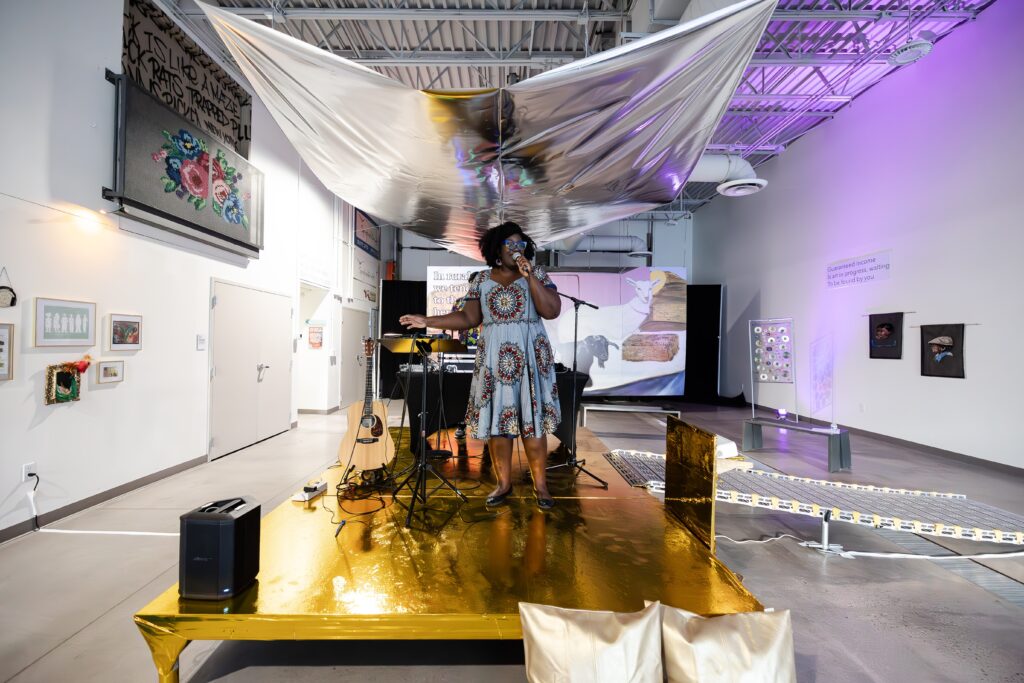
The Mission Award for Innovation recognizes creative applications and nontraditional approaches to solving community challenges. Nominated nonprofit innovations should:
- Bring solutions to community challenges by using current solutions or strategies in new and creative ways or by bringing new solutions to a common problem;
- Focus on doing things differently, rather than just doing things better;
- Take new ideas and implements them successfully with measurable outcomes;
- Employ a variety of strategies in developing these solutions; and
- May collaborate with other nonprofit organizations, businesses, and governmental agencies in their efforts.
Voting for the 2025 Minnesota Nonprofit Mission Awards has officially closed. Thank you for participating!
2025 Innovation Finalists:
Mount Olivet Rolling Acres | Open Arms of Minnesota | Springboard for the Arts

Mount Olivet Rolling Acres
Founded in 1954, Mount Olivet Rolling Acres (MORA) offers community-based services for people with intellectual/developmental disabilities (I/DD), physical disabilities, mental health challenges, and long-term care needs, including aging populations. MORA serves approximately 4,500 people each year. Mission: To enhance personal growth for people with disabilities by offering unique services supported by a caring, dedicated and knowledgeable team.
The mental health crisis among children and youth in the U.S. is growing, and tragically, our system remains inadequate to meet their urgent needs. Minnesota mirrors this crisis, where kids with mental health diagnoses, often accompanied by behavioral challenges, have nowhere to turn during times of crisis. With limited options, these children are often left in hospital Emergency Departments by caregivers or county social workers, where they are “boarded” for days, weeks, or even months. These kids do not require medical hospitalization; instead, they need a stable, supportive environment to heal.
In 2023, over 1,000 children and adolescents in the Twin Cities metro area were boarded in emergency rooms operated by major health systems. Compounding the issue is the loss of crucial residential care spaces — Minnesota has seen a 36 percent reduction in available beds for children in mental health crises since 2005, even as demand continues to rise.
Since 2018, MORA has provided this critical care at its Andover Youth Crisis Stabilization Home. This specialized home serves youth aged 5-17 experiencing mental health crises. With 24-hour, one-on-one support, the home focuses on stabilization, healing, and preparing youth to transition home or into longer-term environments. Through individualized care plans developed with guardians, case managers, and mental health providers, MORA staff teach youth essential coping skills and provide behavioral support, while equipping caregivers with tools and education to prevent future crises.
In response to urgent requests from the seven Twin Cities metro counties, MORA has rapidly expanded this life-saving approach. In May 2025, MORA is opening two new Youth Crisis Stabilization Homes in Richfield and Bloomington, MN, to provide vital additional beds for children in need. MORA also hopes to open two more homes in 2026. These new homes will continue MORA’s innovative model, meeting the core goals of:
- reducing the number of youth boarding in hospital emergency departments and being placed in environments that can retraumatize them, such as detention centers or hotel rooms;
- helping each child gain stability and transition to long-term care; and
- supporting, educating, and equipping caregivers to mediate the mental health needs of their child along with the behaviors that accompany.
MORA recognizes the crucial role of families and caregivers in a youth’s life and strives to involve them in every aspect of their child’s stay. This includes bi-monthly care meetings with the house supervisor, nurse, mental health practitioner, youth, parents/guardians, and support team to review progress, adjust interventions as needed, and share resources to support the child. When a family is preparing for reunification, staff offer 1:1 sessions to teach hands-on skills and provide support. Staff also visit the home or new placement to help ensure a smooth transition.
MORA’s Youth Homes represent a creative and effective solution to the mental health crisis among Minnesota’s children and youth, providing essential support and stability during times of crisis.

Open Arms of Minnesota
Open Arms of Minnesota (OAM) began as a single act of kindness in 1986, with founder Bill Rowe cooking food in his apartment and delivering it to a handful of neighbors living with AIDS who had become too sick to cook for themselves. Three decades later, the initiative has grown into an organization with a state-of-the-art facilities in Minneapolis and St. Paul, which has allowed them to prepare and deliver millions of meals for thousands of clients and their loved ones.
Open Arms core program pairs medically tailored meals with nutrition education and counseling provided by Registered Dieticians. This model ensures that clients receive both the nutrition and the information they need to improve their health. The organization’s knowledgeable client services team refers clients to other resources they might need thanks to a dense network of partner organizations.
As a result of Open Arms’ client-centered program evaluation, in 2022, OAM launched the Cultural Meals Program, a community-based research and development project seeking to create authentic and comforting menus reflecting traditional Latinx, Hmong, and East African cuisines. The need for menu development was supported by a community needs assessment conducted (pro-bono) by 3M, which indicated that these three communities had the greatest prevalence of the diseases we can support, and thus the greatest unmet need in the Twin Cities.
Additional challenges for members of these communities who have chronic or critical illness may include poverty, isolation, and connection to culturally relevant resources. The Open Arms approach of providing familiar meals at no cost, a caring community, and connection to other resources to support their stability and wellness, are sure to be particularly meaningful for program participants from the Hmong East African, and Latinx communities.
Open Arms staff cultivated relationships with organizations that focus on serving these communities – those organizations helped us build a portfolio of authentic recipes, gather feedback on packaging and program services, and taste menu items. Menus were developed through months of tastings, evaluations, and client feedback. The Hmong menu launched in late 2023, the East African Menu fully launched in October 2024. We are now in the development phase of our Latinx menu which we hope to fully launch in 2025. Outreach to culturally relevant organizations and referrers is ongoing, to ensure these menus reach people who need them most.
Having culturally familiar menus that reflect the demographics of the Twin Cities community is essential in keeping people engaged in our programming, and thereby continuing to provide an additional stabilizing factor in their lives which can support their wellbeing. The impact of OAM’s work is best described by its clients, with one East African client sharing: “With American work/school schedules, it is difficult to find time to prepare many traditional dishes and meals. By having these provided by Open Arms, it can help reconnect people to their family’s traditions.”

Springboard for the Arts
Founded in 1991, Springboard for the Arts is an artist-led community and economic development organization. The organization’s mission is to support artists with the tools to make a living and a life, and to build just and equitable communities full of meaning, joy, and connection.
From offices in Saint Paul and Fergus Falls, Springboard delivers resources tailored to creative workers and pilot bold ideas rooted in local needs. In FY24, they served over 22,000 artists and culture bearers in 67 of Minnesota’s 87 counties and channeled $1.1 million directly into communities through artist fees, fellowships, microgrants, and guaranteed income payments.
In October 2024, Springboard for the Arts expanded its Guaranteed Income for Artists pilot, committing to support 100 artists across Minnesota for five years. Originally launched in 2021 as a “sidecar” to the City of Saint Paul’s People’s Prosperity Pilot, this expansion makes it one of the longest-running guaranteed income pilots in the country — and a national model for how direct cash support can transform artists’ lives, build community resilience, and strengthen local economies.
Artists are essential to our communities, yet many — especially freelancers and gig workers — lack a financial safety net. These challenges are compounded for BIPOC, LGBTQIA+, disabled, rural, and underinvested urban artists. Springboard’s pilot explores how guaranteed income impacts artists and creative workers at a neighborhood level and offers a model for integrating artists into broader efforts to address economic inequity.
The program currently supports 50 artists in Otter Tail County and 50 in Saint Paul’s Frogtown and Rondo neighborhoods with $500 in no-strings-attached monthly payments for five years. It remains the only guaranteed income program in the country to include rural artists.
Importantly, Springboard centers artists not just as recipients, but as storytellers and change agents. Two artist cohorts made up primarily of BIPOC participants in both regions have developed narrative change projects that challenge myths about guaranteed income and show its impact on real families and communities. From coloring books and podcasts to postcard campaigns and rural billboards, these creative works are reshaping public perception and advancing the role of artists in economic justice movements.
Springboard launched its Guaranteed Income for Artists pilot in 2021 with the City of Saint Paul as a foundational partner. Additionally, the organization has partnered with the University of Pennsylvania’s Center for Guaranteed Income Research to conduct comprehensive studies to chart our pilot’s impact, as well as with LSS Financial Counseling to provide “wrap-around” support services to our guaranteed income pilot participants including personal finance guidance, student loan debt assistance, and housing counseling.
Since expanding to Otter Tail County, Springboard’s pilot and accompanying artist-led narrative change projects have prompted meaningful community dialogue about guaranteed income in rural communities and collective values of freedom, interdependence, and care. Narrative change artist Kandace Creel Falcón installed a billboard along a rural highway outside Foxhome, MN featuring a painting of their three goats alongside the phrase “In rural, we tend to the herd.” “Guaranteed Income for artists in our rural communities, is like saying ‘we’ve got your back,’” said Falcón. “Our communities are strengthened when we tend to each other.”
Guaranteed income has also provided artists freedom in creating, letting them take risks, invest in themselves, and allowing them to create what they want and what serves their communities rather than what is driven by funders.